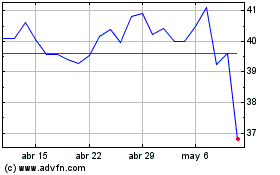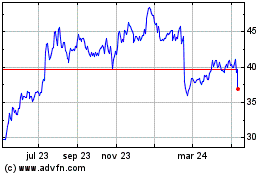Genius Media Sues Google, Claiming Anticompetitive Use of Song Lyrics -- Update
03 Diciembre 2019 - 7:55PM
Noticias Dow Jones
By Robert McMillan
Five months after it accused Google of publishing lifted song
lyrics, music website Genius Media Group Inc. is suing the search
giant over what it alleges amounts to anticompetitive behavior that
has harmed its business.
The lawsuit, filed in state court in Brooklyn, N.Y., on Tuesday,
seeks $50 million in combined minimum damages from Google and
LyricFind, a Canadian company that provides the music lyrics.
The case puts a spotlight on growing concerns that big tech
companies like Google, a unit of Alphabet Inc., can stifle smaller
competitors through some of their business practices. The Justice
Department and Federal Trade Commission have started investigating
some actions of tech companies. Companies including Yelp Inc. and
TripAdvisor Inc. have accused Google of unfairly preferring its own
content in search results.
Genius, based in Brooklyn, says traffic to its site, where it
posts hard-to-decipher lyrics to hip-hop and other hit songs, began
falling because Google began publishing lyrics on its own platform.
Genius alleges some of the lyrics were lifted directly from its
music website.
Genius holds no copyright claims on the lyrics but says lifting
lyrics from its site violates its terms of service.
Google has said it doesn't scrape websites. It says it secures
licenses and lyrics transcriptions from business partners such as
LyricFind, which licenses lyrics from music publishers, giving
companies that also include Amazon.com Inc. and Microsoft Corp. a
way to publish lyrics online.
Google didn't immediately respond to a request for comment on
the lawsuit. A LyricFind spokesman said the company hasn't had
contact with Genius since June, hasn't been served with the
complaint and believes the case to be "frivolous and without
merit."
LyricFind on its website said in June that while it doesn't copy
lyrics from Genius.com, it is possible that it had "unknowingly
sourced Genius lyrics from another location." LyricFind also said
the scale of the alleged copying was "minuscule and clearly not
systemic."
Genius in June disclosed that from October to December 2018 it
used a clever system to watermark 301 of its song transcriptions,
with a Morse-code message. It claims that 116 of them -- or about
39% of the total that were watermarked -- appeared in lyric boxes
published on Google.com.
Genius says after it went public with its allegations, the
watermarks were removed from Google's website but that reuse of its
transcriptions persists.
In August, Genius created a new watermark, this one embedded in
the obscure characters used to create blank spaces between words of
song lyrics. Genius said it has found more than 1,000 examples of
lyrics with the new watermark on Google's website, although some
were subsequently replaced with nonwatermarked versions.
As of this week, 828 of those lyrics contained watermarks,
Genius said. These came from LyricFind and another lyrics site used
by Google called Musixmatch SpA, Genius says.
In an email before the suit was filed, Musixmatch Chief
Executive Max Ciociola called Genius's complaints "ridiculous,"
since it doesn't hold copyright to the lyrics in question. Mr.
Ciociola said Musixmatch transcriptions have shown up on
Genius.com. "This is how [the] internet works when it's about
text," he said.
Genius says that it has seen its traffic from Google decline
since the search company started posting lyrics directly to its
site in boxes, which it calls "information panels," rather than
refer users to Genius's website.
The impact on Genius's web traffic can be stark, the music site
said. In October, Genius posted to its website a watermarked
transcription of Selena Gomez's new single, "Lose You to Love Me."
Within a day, the page was the most-viewed on Genius.com, with more
than 600,000 page views. According to Genius, 75% of people
searching for the song were clicking through to its site.
On Nov. 4, Google posted a version of the lyrics credited to
LyricFind to the Google search page, and click-throughs to Genius
plummeted to 5%, Genius says. The lyrics Google showed contained
the Genius watermark as of Tuesday.
Without a copyright claim, Genius faces an uphill battle in the
courts, said John Bergmayer, legal director with the consumer
advocacy group Public Knowledge. But Google has to take the growing
number of complaints seriously given the antitrust probes, he said.
The cases could be used to establish a pattern of behavior that
would be actionable in an antitrust case, Mr. Bergmayer said.
Write to Robert McMillan at Robert.Mcmillan@wsj.com
(END) Dow Jones Newswires
December 03, 2019 20:40 ET (01:40 GMT)
Copyright (c) 2019 Dow Jones & Company, Inc.
Yelp (NYSE:YELP)
Gráfica de Acción Histórica
De Mar 2024 a Abr 2024

Yelp (NYSE:YELP)
Gráfica de Acción Histórica
De Abr 2023 a Abr 2024
